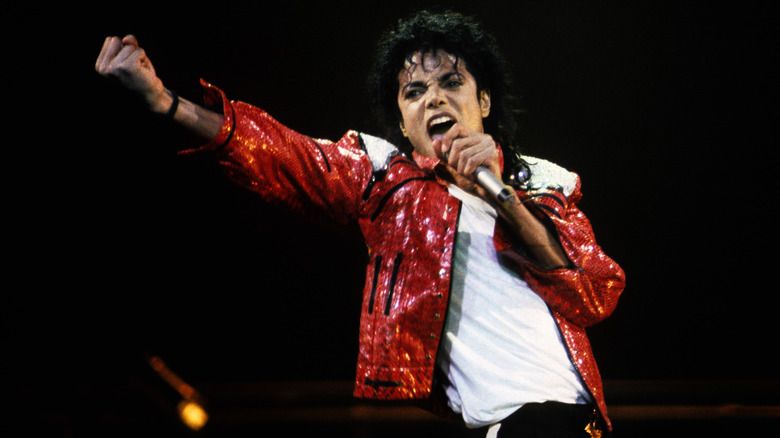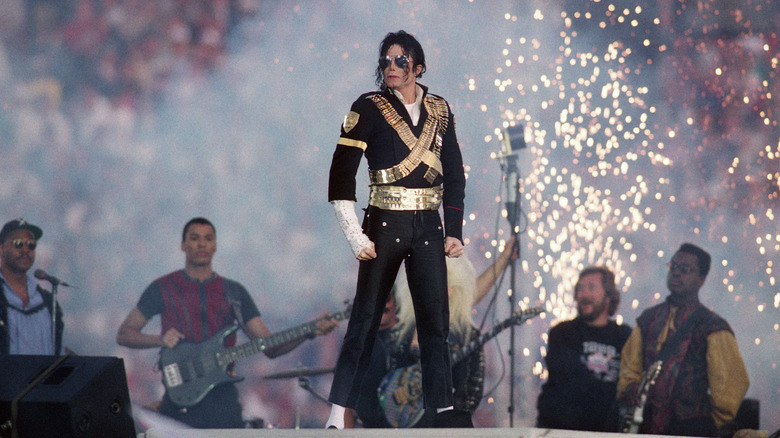The Hit Michael Jackson Song Quincy Jones Claimed Was Stolen
Michael Jackson is unquestionably one of the biggest — if not the biggest — global pop superstars in history. Some estimate that he sold 1 billion records in total, although The New Yorker says a more realistic assessment places his sales at around 400 million at the time of his death in 2009. Given the shift to downloads, streams, etc., that number safely rose to 550 million even by 2013. And out of all his monster hits — "Smooth Criminal," "Bad," "Beat It," "Thriller," etc. — it's "Billie Jean" that has the most streams on Spotify at the time of writing, hovering around 1.9 billion.
"Billie Jean" was a big part of the success of 1982's "Thriller," an album sandwiched between 1979's "Off the Wall" and 1987's "Bad." It's still the highest-selling record of all time, and "Billie Jean" came equipped with a memorable video, dance, and of course, one of the most hummable, instantly recognizable basslines of all time.
"Off the Wall," "Bad," and "Thriller" were all produced by the legendary and late Quincy Jones, who is responsible for much of the quality, sound, and direction of these albums. But even though Jones called Jackson "one of the most talented kids in the history of show business" in a 2012 interview with The New York Times, he also called Jackson "as Machiavellian as they come" in a 2018 interview with Vulture. Jackson, he said, had ripped off the bassline in "Billie Jean." Jones later apologized for this statement on X that year, but his jab left many people wondering: Was he telling the truth?
Accusations of ripping off Donna Summer for Billie Jean
There's a clip from 2003's "Living with Michael Jackson" documentary that features interviewer Martin Bashir questioning the King of Pop about his songwriting process — and about how he wrote "Billie Jean," in particular. Jackson suggested his creative inspiration came from fortune as opposed to nose-to-the-grindstone workmanship. "If I sat here and played some chords — whatever — and say 'I'm going to write the best song ever written,' nothing happens," he said. The singer said that music just occurs to him after a sign from "something in the heavens" and mentioned how he came up with "Billy Jean" while he was noodling around with a funky bassline while driving his car one day. Any musician or creative reading this will be shrugging at this point and saying, "Well yeah, sure."
In the aforementioned Vulture interview, however, Quincy Jones said that Jackson intentionally "stole" the bassline of "Billie Jean" from disco legend Donna Summer. Jones said that the song is a copy-paste job of Summer's "State of Independence" released in 1982, the same year that Jackson released "Thriller." "The notes don't lie, man," Jones said.
This is true, as we can see from both songs' actual sheet music. "State of Independence" is in B-flat major, while "Billie Jean" is in F-sharp minor. Aside from major and minor keys sounding radically different and conveying completely different feelings, the notes of the songs don't lie: They're totally different. Also, the tempos are different. "State of Independence" sounds "faster" — as some might say — because its notes are 16th notes and not 8th notes (twice as long) as in "Billie Jean."
Other instances of alleged plagiarism
In the interview with Vulture where Quincy Jones talked about Michael Jackson's alleged plagiarism of Donna Summer's "State of Independence," he called the King of Pop "greedy." Besides his assertion that Jackson stole the bassline of "Billie Jean," he said that the singer refused to give song credit to a writer on 1979's "Don't Stop 'Til You Get Enough" from "Off the Wall." This unsubstantiated tale — explained in full on Smooth Radio — comes from the person who claims that Jackson ripped him off: musician Greg Phillinganes. He says that Jackson brought him an early cut of the song, and he suggested that it needed another section, which evolved into the song's bridge. As the story goes, the pair agreed that Phillinganes should get a 10% cut of the song, but he never saw the money.
Besides these instances, some Jackson fans have talked about whether or not he legally sampled other people's songs. Sampling happens all the time, especially amongst rap, hip-hop, and pop, and is typically totally legal with permission from the owner of the song and recording (in certain cases, this is not even required). Forum chatter on the MJJ Community says that Jackson sampled rap legend Biggie Smalls' 1994 song "Unbelievable" for his 2001 promotional single "Unbreakable." Sites like Who Sampled say the same and have side-by-side clips of the supposed sample in question — although if true, the bit was definitely pitch shifted. Besides these examples, Jackson sampled the choral piece "Pie Jesu" for 1995's "Little Susie" and Ludwig van Beethoven's "Symphony No. 9" for 1991's "Will You Be There."
Claims of 'Billie Jean' ripping off even more tracks
While Quincy Jones claimed that "Billie Jean" ripped off Donna Summer's "State of Independence," some have claimed it rips off other works. There's almost a cottage industry of articles, videos, and breakdowns about this one topic. In 2018, for instance, Page Six featured a story about how "Billie Jean" cribbed from funk legend Rick James' 1981 track "Ghetto Life." This information comes to us via La Toya Jackson's ex-fiancé Jeffre Phillips, whoever he is. And if you listen to only the opening snare-and-kick drum part for "Ghetto Life," you'd be forgiven for agreeing. But the music? Nothing matches. Besides, "Ghetto Life's" kick drum on the 1 and 3, plus snare on the 2 and 4, is generic enough to be uncopyrightable.
On the video front, analyses like that on Digging the Greats reference this apparent Jackson-James connection and also bring up yet another comparison, this time to Hall & Oates' 1981 song "I Can't Go For That (No Can Do)." That video references a 2015 interview with HuffPost Live where Daryl Hall says that Jackson once told him that he used "I Can't Go For That (No Can Do)" to write "Billie Jean," to which Hall replied, "Doesn't sound like 'No Can Do" to me!" The analysis correctly concludes that countless songs use the same notes in similar patterns, especially as a consequence of genre conventions, our collective musical catalog, and even the restrictions of Western musical structure.
Jackson won a copyright lawsuit in 1994
There are a lot, lot more examples of folks accusing Michael Jackson of plagiarism. And because he was such an international star, some of them even occurred across borders in countries like Italy and Belgium. But this is exactly the point: It stands to reason that so many people have come after Michael Jackson for plagiarism because his music is so prolific and well-known. Everyone's heard "Billie Jean" so many times, for example, that any music containing even remotely similar characteristics must be related to "Billie Jean," right? Wrong.
Along these lines, a federal jury in 1994 ruled that Jackson did not plagiarize three other songs: "Thriller," "The Girl Is Mine," and, "We Are the World." As the Los Angeles Times explained at the time, the lawsuit came from childhood friends of the Jacksons, Reynaud Jones and Robert Smith, who claimed that his songs pulled from tracks they recorded in 1977. Jackson testified via video and demonstrated his songwriting technique, and the court ruled in his favor.
Quincy Jones, the most powerful person to accuse Jackson of stealing music, reneged his statement about two weeks after his initial Vulture interview published on February 7, 2018. On February 22, Jones took to X to say that his six daughters reamed him for his comments. "I am an imperfect human & I'm not afraid to say it," he wrote. "And I'm sorry & I'm not afraid to say it." He also thanked his friends and family for their "grace."
For a deep dive into this topic, here are some musicians who stole their biggest hits.




